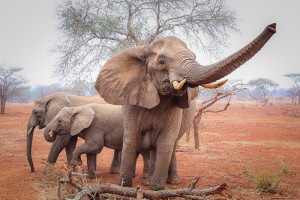March 12-18, 2015, Current Events Lesson Plan
Thursday, March 19th, 2015
Current Event: Elephants Sense Trouble
The United States Army Research Office is conducting tests in South Africa to see whether elephants can identify explosives by smell, just like dogs. In multiple tests, elephants were led to a line of buckets. One of the buckets had an object as small as a cotton swab laced with TNT. The elephants correctly identified the bucket containing TNT almost every time. These results have raised speculation about whether an elephant’s strong sense of smell can truly save lives. This project stemmed from an observation that some elephants seemed to intentionally avoid mine-filled areas in Angola after many years of civil war. With African elephants being the largest animals to live on land, it would not make sense to herd them around minefields to sniff out danger. And, no one would want to risk the safety of these animals, as they are vulnerable to becoming extinct because of poaching. So, instead, researchers would use unmanned drones to collect scent samples from mined areas and bring the samples back to the elephants. A trained elephant would sniff the samples and alert human handlers to any signs of explosives.

South African elephants may be good at smelling out explosives. Credit: © Moments by Mullineux/Shutterstock
Objective:
Elephants are the largest land animals. There are two chief kinds of elephants, African elephants and Asian elephants, also known as Indian elephants. African elephants live only in Africa south of the Sahara. Asian elephants live in parts of India and Southeast Asia. There is some uncertainty about the number of elephants that survive in the wild. In Asia, human population growth and habitat destruction have severely reduced the number of wild elephants. Scientists estimate that only about 50,000 Asian elephants survive in the wild. In Africa, the main cause of the decline in elephants is illegal hunting. In 1979, an estimated 1,300,000 elephants lived in Africa. Today, there are about 500,000. Elephants are extremely strong and highly intelligent. People have tamed and trained them for thousands of years. An elephant’s trunk, which can measure 5 feet (1.5 meters) and weigh 300 pounds (140 kilograms), is a combined nose and upper lip. An elephant smells and breathes with its trunk and uses its trunk to sniff the air and the ground constantly. Its sense of smell is more sensitive than that of any other animal. The Behind the Headlines news story and related World Book articles explore elephants and other animals.
Words to know:
- Animal
- Elephant
- Endangered species
- Explosive
- Ivory
- TNT
- United States Army
- Unmanned aerial vehicle (UAV)
Discussion Topics:
1. Besides elephants, ask your students to name other animals native to Africa. (Students might say cheetahs, chimpanzees, giraffes, gorillas, hippopotamuses, lions, ostriches, rhinoceroses, and zebras.)
2. Asian elephants are an endangered species and African elephant are considered a vulnerable species. Ask your students to debate, “Scientists should clone animals that are endangered.”
3. Ringling Bros. and Barnum & Bailey Circus recently announced that they would retire their performing elephants by 2018. Ask your students to debate, “Wild animals should be banned from performing at circuses.”


